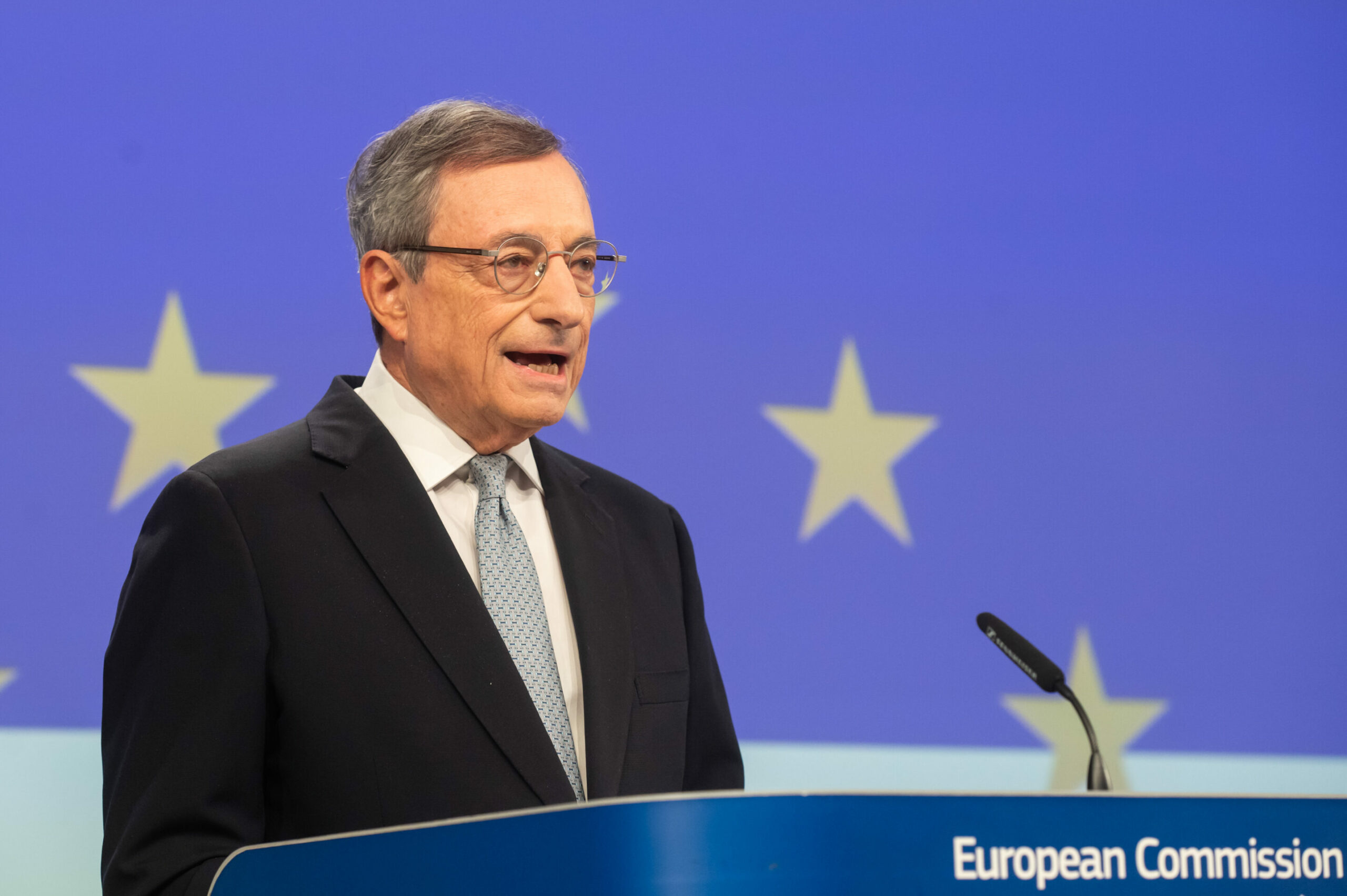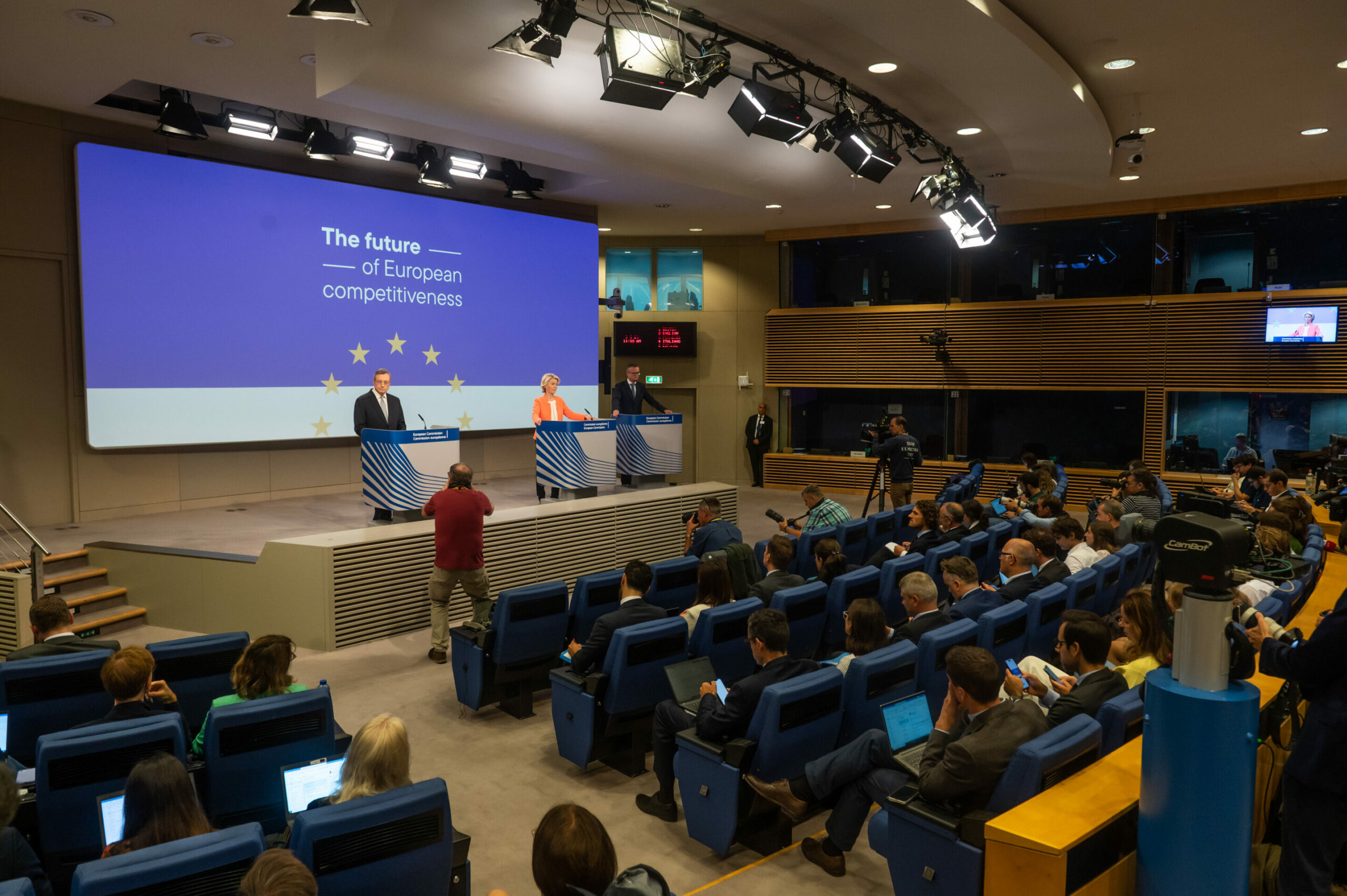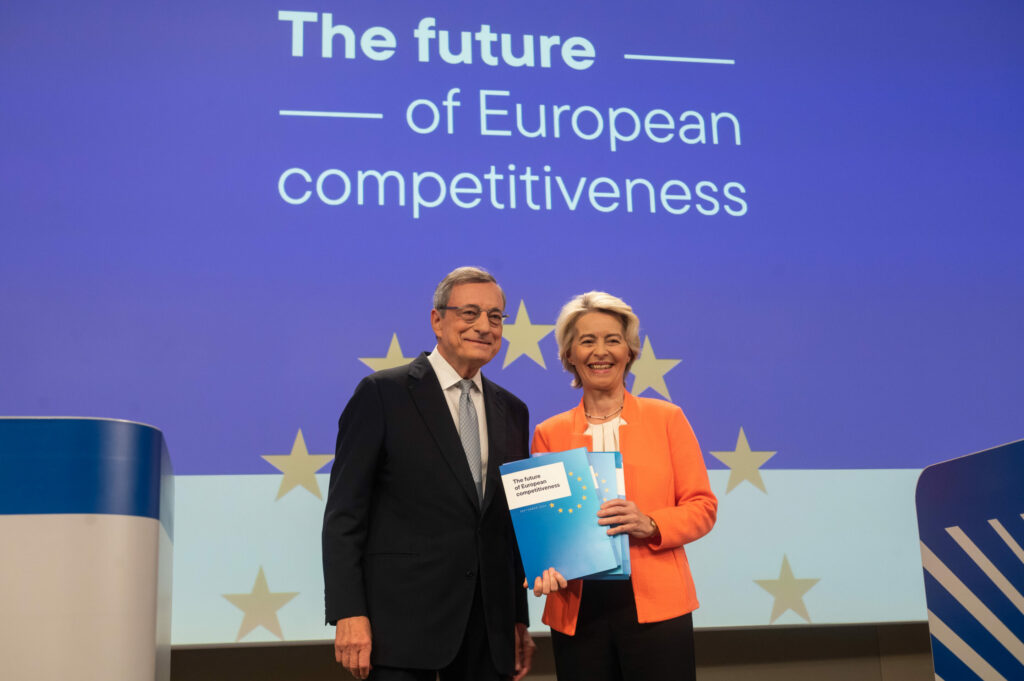The EU needs to boost its annual investment by around €800 billion per year in order to meet the "existential" economic challenges it faces.
That is according to a dense report by former European Central Bank (ECB) president Mario Draghi, unveiled today. It lays out around 170 proposals on how the EU can boost its competitiveness to keep up with economic heavyweights like the US and China.
The report recognises key challenges for the EU economy, such as increased foreign competition, the disruption of Russian energy supplies, and geopolitical tensions, which are all coming to a head in conjunction with a slowdown in population growth.
"The EU is entering the first period in its recent history in which growth will not be supported by rising populations. By 2040, the workforce is projected to shrink by close to 2 million workers each year. We will have to lean more on productivity to drive growth," said Draghi.
The economist and former Italian Prime Minister warned that the challenges to the EU are "existential".
"If Europe cannot become more productive, we will be forced to choose. We will not be able to become, at once, a leader in new technologies, a beacon of climate responsibility and an independent player on the world stage. We will not be able to finance our social model. We will have to scale back some, if not all, of our ambitions," Draghi wrote in a foreword to the report.
The report says that EU investment will have to rise by around 5 percentage points of GDP each year – an "unprecedented" step up in spending to levels not seen in over fifty years. The Marshall Plan for economic recovery after the Second World War required an investment increase of around 1-2% of GDP annually.
The report on the future of European competitiveness, prepared by Draghi at the request of European Commission President Ursula von der Leyen, lays out three key action areas to "reignite sustainable growth" in the EU.
Investing in tech
Firstly and most importantly, Draghi notes that Europe needs to close the "innovation gap" with the US and China and invest in new technologies like artificial intelligence (AI). The report notes that since 2000 real disposable income per capita has grown almost twice as much in the US as in the EU.
The report highlights that Europe "missed out" on the digital revolution of the internet, as the current productivity gap between the EU and the US is largely explained by the tech sector and only four of the world's top 50 tech companies are European.

Mario Draghi. Credit: European Commission
It also notes that many European entrepreneurs are leaving the region, with close to a third (30%) of the EU's "unicorn" startups – that went on to be valued at more than $1 billion – having relocated their headquarters abroad, mostly to the US.
"The problem is not that Europe lacks ideas or ambition... we are failing to translate innovation into commercialisation, and innovative companies that want to scale up in Europe are hindered at every stage by inconsistent and restrictive regulations," said Draghi.
What the EU isn't getting right
Secondly, the report highlights the need for a joint plan on decarbonisation and competitiveness, noting that while markets like China could offer the "cheapest and most efficient" routes to meeting climate targets, promoting indigenous EU industries relating to energy and decarbonisation could benefit Europe's economic growth as well as the planet.
Finally, the report warns that the EU's dependence on imported raw materials – especially from China – leaves it "vulnerable to coercion". To maintain its freedom the bloc must develop a foreign economic policy. Moreover, the EU's defence industry is "too fragmented" and Europe must prepare for potential security threats and strengthen its ability to act as a cohesive power.
Outlining the three key action areas, Draghi also noted three factors that are currently "holding back" the EU from becoming more competitive.
He said that Europe is good at setting out common goals but "lacks focus" when it comes to following up with clear priorities or policy actions. He added that Europe is "wasting its common resources" by diluting spending power across multiple national and EU instruments.
Finally, Draghi noted that due to its "slow and disaggregated policymaking process", the EU is not able to develop broad industrial strategies like the US and China (where strategies can stretch across policy areas like domestic production, trade and competition, and foreign supply chains).

Economist Mario Draghi and Commission President Ursula von der Leyen at a press conference unveiling the report on EU competitiveness
Where will the money come from?
As to how the EU should raise an additional €800 billion per year to meet the challenges outlined in the report, Draghi said that the bloc needs to continue with the Capital Markets Union (a plan to develop a single market for investors in the EU).
But he noted that private investors "will not be able to bear the lion’s share of financing investment without public sector support". Certain pan-European projects like defence procurement or cross-border grid development will require common action and potentially common funding from Member States.
He added that the more willing the EU is to reform itself to boost productivity, the "more fiscal space will increase" and the easier it will be for the public sector to invest.
The Commission's playbook
At the unveiling, Commission President Ursula von der Leyen said the report has already informed her political guidelines for the new term. She added that it will "continue to inspire" the work of the Commission "for the months and years to come".
In particular, the President highlighted the need to turn the clean and digital transition into a "competitive advantage" for the EU, the need to "step up investment in skills" to boost the EU job market, and the need to build robust and resilient supply chains for the bloc.
"A year ago, I asked you to prepare a report on the future of Europe's competitiveness with recommendations to tackle the economic challenges we face at home, and to reach a stronger position in a world of tough economic competition," she said to Draghi. "Since then, the topic has even gained momentum, especially with the impulse of EU leaders in the European Council. Now there is wide consensus that it must be at the top of our agenda and at the heart of our action."

